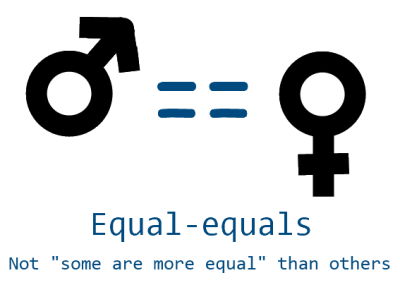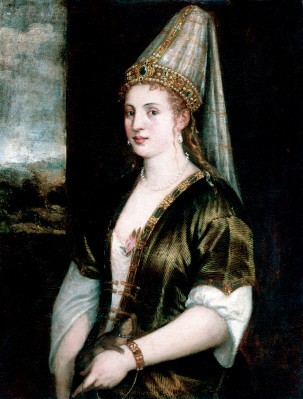 I have recently learnt about features assigned to women and men by a Tibetan Lama. Women are seen as having better access to qualities of space and therefore holding special kinds of wisdom that lead to Enlightenment. Men, on the other hand are better suited to create and act within space, and this they are rightful owners of the actions that lead to Enlightenment.
I have recently learnt about features assigned to women and men by a Tibetan Lama. Women are seen as having better access to qualities of space and therefore holding special kinds of wisdom that lead to Enlightenment. Men, on the other hand are better suited to create and act within space, and this they are rightful owners of the actions that lead to Enlightenment.
In popular Goddess spirituality it is also normal to find distinction between women and men’s core traits. The properties assigned to the “feminine” and the “masculine” usually follow the same pattern: Goddess stands for interconnectedness, and thus relations and caring for others. God (if there is a place for him) is about protection and action.
 I am afraid to say that to me, this approach only embeds patriarchal order by putting women firmly in the sphere of domesticity, even if in the elevated role of “Domestic Goddess”, while men are still expected to go out, fight and thus organise and rule society, which women are expected to preserve.
I am afraid to say that to me, this approach only embeds patriarchal order by putting women firmly in the sphere of domesticity, even if in the elevated role of “Domestic Goddess”, while men are still expected to go out, fight and thus organise and rule society, which women are expected to preserve.
Gender is a societal concept. Gender roles are assigned through a complex process of struggle between gender discourses. These gender narratives are backed up by various political forces. They can also be assumed uncritically by the entire population. However, even if practically everyone in a given society believes that female genitals should be cut or that there is no difference in how men and women are treated and therefore the feminist cause is dead, neither is a reality.
 Religions can uphold a particular gender discourse. Some religions are more insistent on gender roles as divinely prescribed than others. When the gender narrative about women is blatantly patriarchal, it is relatively simple to criticise it from the feminist point of view. However, I would argue that even positive stereotypes propagated by a religion about women’s “nature” and “core characteristics” are damaging to the feminist cause.
Religions can uphold a particular gender discourse. Some religions are more insistent on gender roles as divinely prescribed than others. When the gender narrative about women is blatantly patriarchal, it is relatively simple to criticise it from the feminist point of view. However, I would argue that even positive stereotypes propagated by a religion about women’s “nature” and “core characteristics” are damaging to the feminist cause.
Buddhism is not one of the religions where descriptions of women’s character and roles in society are central to spirituality. It is generally understood in Western Buddhist community that the Buddha’s teachings aimed predominantly at how to organise one’s mind, whereas much less attention is directed at how to organise one’s society.
My dear friend from Russia sent me a book by her Lama Ole Nydahl called Buddha and Love. I am reading it in Russian so I apologise for absence of page numbers. In the book, the Lama firstly quite definitely pronounces that both women and men can get enlightened, and when they do, there is no difference in the nature of Enlightenment. So far so good.
However, the Lama also talks about differences between men and women, in order to show how these differences can be used constructively on the road to Enlightenment of both.
Unfortunately, the way the Lama describes women and men seems to me to justify the unequal position of men and women in a Western society. In short, men seem to be responsible for running things, while women are left to pick up the rubbish – both physical and psychological. One example the Lama gives is for a woman not to get hurt when her male partner speaks to her abruptly on the phone from his office. Also, the Lama suggests the woman should meet and greet her partner with a dinner and a smile.
The Lama states that women raise the offspring better, because of their superior intuition and caring skills. Not by choice, say I. Women are left with raising children because this occupation bears low social status. Higher status jobs are reserved for men. Women have no other choice other than becoming good at caring for the young. This goes also for becoming flexible, quiet and attentive to other people’s (men’s) moods. If you are not, in some cultures, you are beaten or killed.

Let’s look at the example of Roxelana, the wife of the Sultan Suleiman the Magnificent of the Ottoman Empire. Kidnapped from Ukraine and made a slave in the 1500’s, she managed to secure a highly influential position in the Empire. She did it through intrigues against other Sultan’s concubines in the Harem and through killing the Sultan’s Vizier and his eldest son. This cleared the path to the throne for her own son.
Can we admire Roxelana? Definitely. She was a remarkable woman, who dealt in the best possible way with the hand she got. Should we treat her life as an example of how we should behave? Definitely not. Roxelana turned domesticity and child rearing into a tool for gaining power. Nevertheless, hers is clearly not an example to follow.
While the most powerful woman in the Empire, Roxelana still could not show her face outside the Harem. She never saw the baths and mosque she commissioned in Istanbul. In addition, the path to the top was painted with blood. Nowadays under patriarchy women find themselves in a similar situation of little choice. This is the reason why I think it is wrong to assume that the qualities that women develop under patriarchy as their inherent traits.
Women can’t help but developing qualities such as patience, tenderness and forgiveness: they have a lot to forgive. Under patriarchy, women are forced into the roles of carers. So they become good ones. However, this does not mean that the traits they develop are women’s inherent traits. Nor does it mean that this order of things should continue.
Assigning some positive qualities exclusively to women hurts men too. I recall a disapproving comment a woman made on seeing a girl play a violent video game: “This is not a game for girls”. I thought about implications of this comment: So, it is not OK for a girl to cultivate violent traits, but it is OK for a boy?
Would it not be better if we took all the positive traits of humanity: wisdom, action, perseverance, loving kindness, bravery, intelligence, and encouraged all people: men, women and gender queer to cultivate these?
Oxana Poberejnaia is a content writer. She was an Officer of the University of Manchester Buddhist Society while studying for a PhD in Government, and has been involved in organising the Manchester Buddhist Convention, now in its 10th year. Oxana is now exploring the Sacred Feminine through marking seasonal festivals, working with her menstrual cycle, frame drumming and shamanic journeying, while keeping the practice of Buddhist meditation. Oxana is an artist and an author. Her works can be found on her blog.


I agree with your conclusion and indeed said much the same thing myself in a recent blog: https://feminismandreligion.com/2015/05/18/what-if-divine-feminine-and-divine-masculine-are-not-oppositional-categories-by-carol-p-christ/
I think it may be as important to distinguish to Goddess feminism from other invocations of the Goddess as it is to distinguish Christian feminism from Christianity in general. When the Goddess is discussed without a criticism of patriarchy and war, old stereotypes are likely to be repeated. Goddess feminists are aware of such pitfalls, and they strongly critique traditional dualistic thinking and affirm women’s agency and rationality along with our ability to care, etc.
The process metaphysic can be helpful here, as it affirms that all individuals–male female human other than human–are both relational and intelligent, thus transcending/criticizing the stereotypes of classical dualisms.
LikeLike
My understanding of Goddess feminism resonates with yours Carol. For many years…since graduate school in the 80s, I have been critiquing the terminology of masculine and feminine and their ascribed traits and qualities, Rather than the dualities typically found in masculinist religions, for me, Goddess embodies a totality of existence – material and transcendent; creative, destructive and regenerative; compassionate and fierce.
LikeLike
Your comment reminds me of how ES Fiorenza attempted to solve this problem by developing the “discursive levels” of her “kyriarchal sex/gender system” of “social-political,” “ethical-symbolic,” “biological-natural,” and “linguistic-grammatical levels,” which latter yields the dialectic terminology spectra of man/woman, masculine/feminine, male/female, and he/she respectively. Unfortunately, I have not seen any published version of it other than a conference paper she presented some years ago in Taiwan.
LikeLike
Dear Carol and Anna, thank you so much for your insightful comments!
LikeLike
Reblogged this on writingontherim and commented:
Another take on how male dominated society affects women and men.
LikeLike
Thank you very much, Juliana, for this honour.
LikeLike
I do not reblog a lot, only what touches me and those messages I really want to share.
LikeLike
Yes, it is a form of gender essentialism, which is contrary to Tibetan Buddhist theology and madhyamaka middle way philosophy, although socialized projection of attributes by cultures is indeed a phenomena. I refuted this argument in great detail in my paper published a few years ago, which you can read at https://www.academia.edu/4342094/Fearlessness_v._Recklessness_A_Refutation_of_Buddhist_Gender_Essentialism_and_Chauvinism_Reconsidering_the_Marks_and_Signs_of_a_Buddha.
Unfortunately, although there are no Buddhist theological reasons for gender discrimination, I suspect this extreme attribution of something positive to women in Tibetan Buddhist culture is a form of contrition for the all-pervasive denigrated role projected on woman and attendant social discrimination historically pervasive in Tibetan social culture, which is still extremely feudal and patriarchal, although finally we have a generation of women and nuns who are receiving formal education more than ever before.
At a yogic level, there are anatomical differences, but until male clerics and Tibetan Buddhism more generally are ready to entertain voices of women as credible, Tibetan language discourse, when it exists, is an echo chamber by and about men’s experience. Even Tibetan women and international Western, Asian, etc women Tibetan Buddhists favor the patriarchal voice over women’s voices, in my observations.
Although it is essentialist and problematic, your Tibetan lama has very likely been educated formally and socialized to believe what he says, which is reinforced by the like beliefs of millions of other Tibetan Buddhist men. We may not find it a worthwhile use of time to challenge the views of other directly, especially if they are not acculturated for or interested in listening to women theologians, practitioners, etc. In that case, other tactics include offering alternative views for students seeking them, supporting women’s education and practice in Buddhism, and engaging patriarchal views when there is a productive critical discourse for it. But in Tibetan Buddhist social culture, including academic culture, there is little in the way of even scholarly academic culture that comprises a forum for such engagement.
LikeLike
Dear Bhikshuni0Trinlae, thank you so much for your detailed and enlightening reply. I completely accept your points and I also hope that Tibetan women win more voice through education. Thank you for the link to your academic article, as well!
LikeLike
In my religion, this goes under the rubric of gender roles are complementary theory, boosted with spiritual examples. Unfortunately, some complementary roles always appear to be more important than other roles, and gross injustice is often a result. I think we need a better theory which would guide more just actions.
LikeLike
Hello, nmr! Thank you for your comment!
LikeLike
I agree with this article and this is my great problem with the divine femenine and other developments about sacred complementariety. By the way, I like very much Roxelana or Hurrem.
LikeLike
Hello, Vanessa! Yes, my Ukrainian friend first told me about her, and then the story of Roxelana was included in the recent BBC documentary “Ascent of Woman”. So, yeah, cool.
LikeLike
Thank you for this Oxana
I wonder if one of the possibilities such reflections suggest is the need for a new anthropology – we seem pretty stuck in how to understand ‘women’ and ‘men’ as if those words describe all human beings – but we know that such a way of seeing ourselves is inadequate. Perhaps we need more words to help us lose the implications of dualism, perhaps it would be useful to have new ways of understanding our options in how to be human. There may be some creative work to be done……
LikeLike
Hello, Margaret! Yes, I so agree. It’s as if for millenia (or, in personal lives, case, for our whole lives) we have been living with notions that guided us and defined the world around us, only to realise now that they have bee untrue. And then, in theory, no one is preventing us from redefining anything we see as causing injustice and suffering. it’s pretty exciting, I would say!
LikeLike